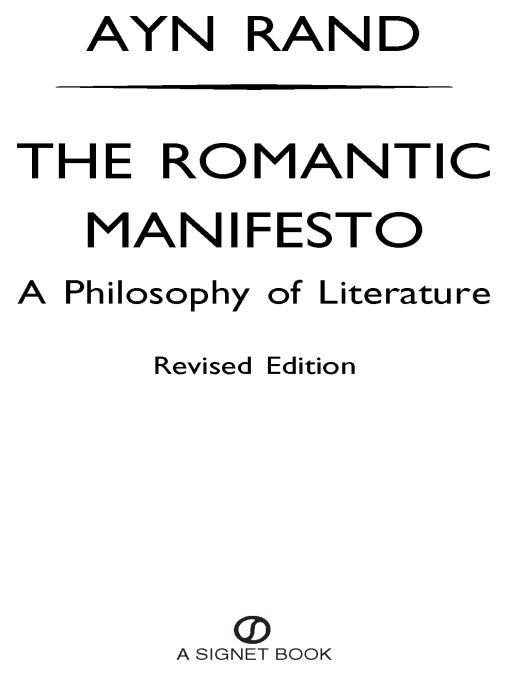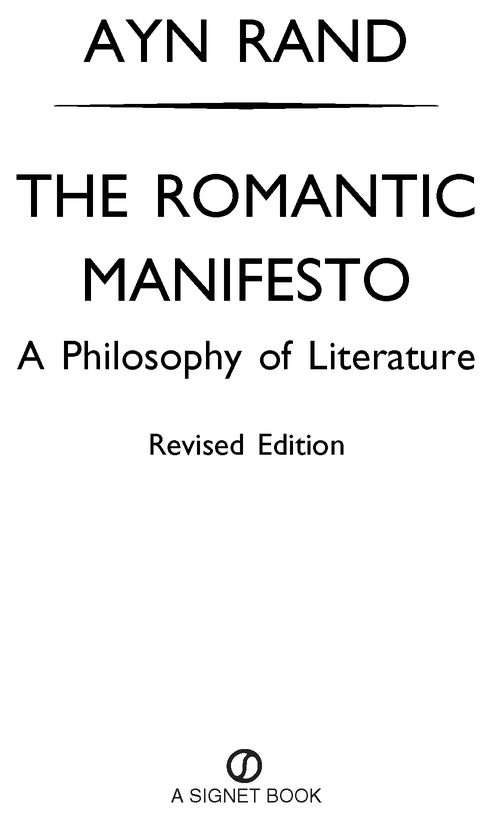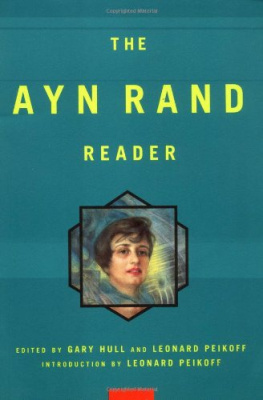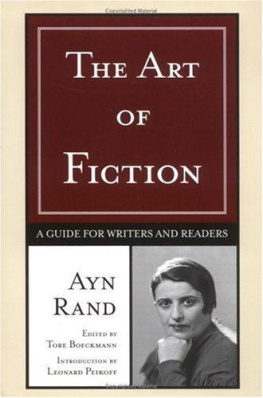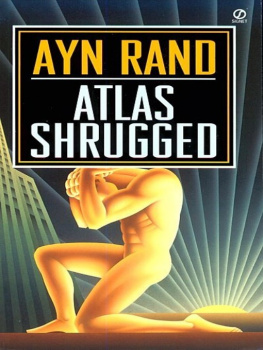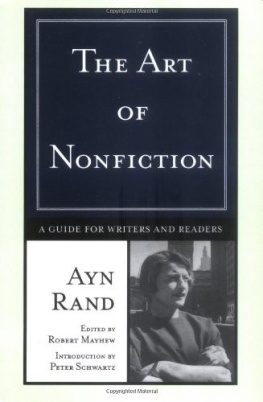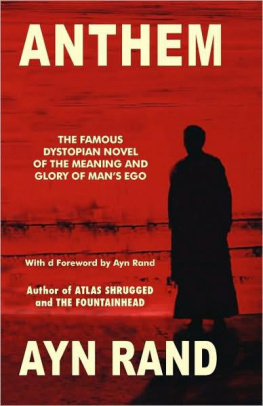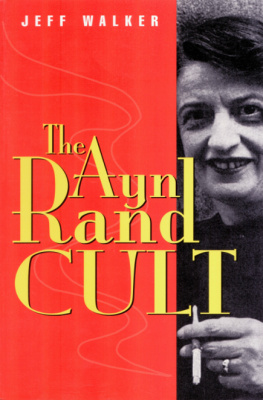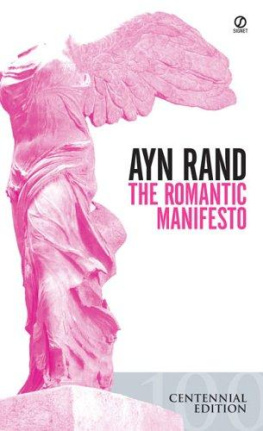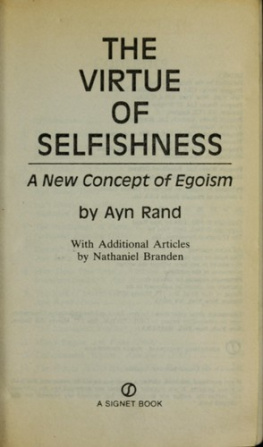Table of Contents
THIS MANIFESTO IS NOT ISSUED IN THE NAME OF AN ORGANIZATION OR A MOVEMENT. I SPEAK ONLY FOR MYSELF. THERE IS NO ROMANTIC MOVEMENT TODAY. IF THERE IS TO BE ONE IN THE ART OF THE FUTURE, THIS BOOK WILL HAVE HELPED IT TO COME INTO BEING.
In this searching and courageous work, Ayn Rand cuts through the haze of sentimentality and vague thinking that surrounds the subject of art. For the first time a precise definition is given to art, and a careful analysis made of its nature. With the uncompromising honesty Ayn Rands millions of readers have come to expect, the author presents a devastating case against both naturalistic and abstract artand explains the force that drives her to write, and the goals she strives to attain. The Romantic Manifesto takes its place as a keystone book in the towering intellectual edifice raised by one of the most remarkable writers and thinkers of our age.
Introduction
THE dictionary definition of manifesto is: a public declaration of intentions, opinions, objectives or motives, as one issued by a government, sovereign, or organization. (The Random House Dictionary of the English Language, College Edition, 1968.)
I must state, therefore, that this manifesto is not issued in the name of an organization or a movement. I speak only for myself. There is no Romantic movement today. If there is to be one in the art of the future, this book will have helped it to come into being.
According to my philosophy, one must not express intentions, opinions, objectives or motives without stating ones reasons for themi.e., without identifying their basis in reality. Therefore, the actual manifestothe declaration of my personal objectives or motivesis at the end of this book, after the presentation of the theoretical grounds that entitle me to these particular objectives and motives. The declaration is in Chapter 11, The Goal of My Writing, and, partly, in Chapter 10, Introduction to Ninety-Three.
Those who feel that art is outside the province of reason would be well advised to leave this book alone: it is not for them. Those who know that nothing is outside the province of reason will find in this book the base of a rational esthetics. It is the absence of such a base that has made todays obscenely grotesque degradation of art possible.
To quote from Chapter 6: The destruction of Romanticism in estheticslike the destruction of individualism in ethics or of capitalism in politicswas made possible by philosophical default.... In all three cases, the nature of the fundamental values involved had never been defined explicitly, the issues were fought in terms of non-essentials, and the values were destroyed by men who did not know what they were losing or why.
In regard to Romanticism, I have often thought that I am a bridge from the unidentified past to the future. As a child, I saw a glimpse of the pre-World War I world, the last afterglow of the most radiant cultural atmosphere in human history (achieved not by Russian, but by Western culture). So powerful a fire does not die at once: even under the Soviet regime, in my college years, such works as Hugos Ruy Blas and Schillers Don Carlos were included in theatrical repertories, not as historical revivals, but as part of the contemporary esthetic scene. Such was the level of the publics intellectual concerns and standards. If one has glimpsed that kind of artand wider: the possibility of that kind of cultureone is unable to be satisfied with anything less.
I must emphasize that I am not speaking of concretes, nor of politics, nor of journalistic trivia, but of that periods sense of life. Its art projected an overwhelming sense of intellectual freedom, of depth, i.e., concern with fundamental problems, of demanding standards, of inexhaustible originality, of unlimited possibilities and, above all, of profound respect for man. The existential atmosphere (which was then being destroyed by Europes philosophical trends and political systems) still held a benevolence that would be incredible to the men of today, i.e., a smiling, confident good will of man to man, and of man to life.
It has been said and written by many commentators that the atmosphere of the Western world before World War I is incommunicable to those who have not lived in that period. I used to wonder how men could say it, know it, yet give it upuntil I observed more closely the men of my own and the preceding generations. They had given it up and, along with it, they had given up everything that makes life worth living: conviction, purpose, values, future. They were drained, embittered hulks whimpering occasionally about the hopelessness of life.
Whatever spiritual treason they had committed, they could not accept the cultural sewer of the present, they could not forget that they had once seen a higher, nobler possibility. Unable or unwilling to grasp what had destroyed it, they kept cursing the world, or kept calling men to return to meaningless dogmas, such as religion and tradition, or kept silent. Unable to stifle their vision or to fight for it, they took the easy way out: they renounced valuing. To fight, in this context, means: to think. Today, I wonder at how stubbornly men cling to their vices and how easily they give up whatever they regard as the good.
Renunciation is not one of my premises. If I see that the good is possible to men, yet it vanishes, I do not take Such is the trend of the world as a sufficient explanation. I ask such questions as: Why?What caused it?What or who determines the trends of the world? (The answer is: philosophy.)
The course of mankinds progress is not a straight, automatic line, but a tortuous struggle, with long detours or relapses into the stagnant night of the irrational. Mankind moves forward by the grace of those human bridges who are able to grasp and transmit, across years or centuries, the achievements men had reachedand to carry them further. Thomas Aquinas is one illustrious example: he was the bridge between Aristotle and the Renaissance, spanning the infamous detour of the Dark and Middle Ages.
Speaking only of the pattern, with no presumptuous comparison of stature intended, I am a bridge of that kindbetween the esthetic achievements of the nineteenth century and the minds that choose to discover them, wherever and whenever such minds might exist.
It is impossible for the young people of today to grasp the reality of mans higher potential and what scale of achievement it had reached in a rational (or semi-rational) culture. But I have seen it. I know that it was real, that it existed, that it is possible. It is that knowledge that I want to hold up to the sight of menover the brief span of less than a centurybefore the barbarian curtain descends altogether (if it does) and the last memory of mans greatness vanishes in another Dark Ages.
I made it my task to learn what made Romanticism, the greatest achievement in art history, possible and what destroyed it. I learnedas in other, similar cases involving philosophythat Romanticism was defeated by its own spokesmen, that even in its own time it had never been properly recognized or identified. It is Romanticisms identity that I want to transmit to the future.
As for the present, I am not willing to surrender the world to the jerky contortions of self-inducedly brainless bodies with empty eye sockets, who perform, in stinking basements, the immemorial rituals of staving off terror, which are a dime a dozen in any jungleand to the quavering witch doctors who call it art.

